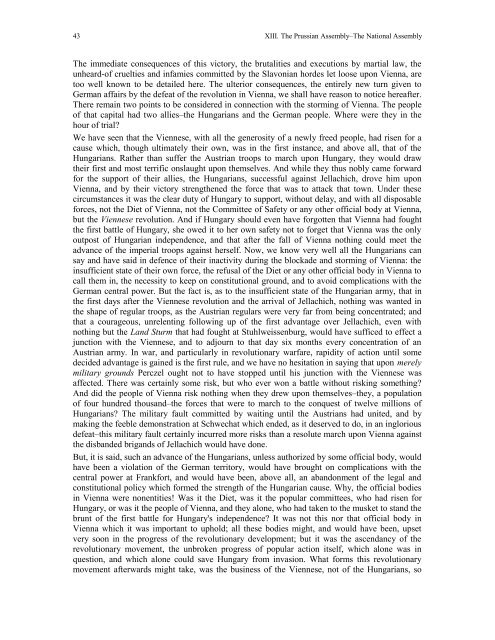Revolution and Counter Revolution in Germany - Marxists Internet ...
Revolution and Counter Revolution in Germany - Marxists Internet ...
Revolution and Counter Revolution in Germany - Marxists Internet ...
Create successful ePaper yourself
Turn your PDF publications into a flip-book with our unique Google optimized e-Paper software.
43 XIII. The Prussian Assembly–The National Assembly<br />
The immediate consequences of this victory, the brutalities <strong>and</strong> executions by martial law, the<br />
unheard-of cruelties <strong>and</strong> <strong>in</strong>famies committed by the Slavonian hordes let loose upon Vienna, are<br />
too well known to be detailed here. The ulterior consequences, the entirely new turn given to<br />
German affairs by the defeat of the revolution <strong>in</strong> Vienna, we shall have reason to notice hereafter.<br />
There rema<strong>in</strong> two po<strong>in</strong>ts to be considered <strong>in</strong> connection with the storm<strong>in</strong>g of Vienna. The people<br />
of that capital had two allies–the Hungarians <strong>and</strong> the German people. Where were they <strong>in</strong> the<br />
hour of trial?<br />
We have seen that the Viennese, with all the generosity of a newly freed people, had risen for a<br />
cause which, though ultimately their own, was <strong>in</strong> the first <strong>in</strong>stance, <strong>and</strong> above all, that of the<br />
Hungarians. Rather than suffer the Austrian troops to march upon Hungary, they would draw<br />
their first <strong>and</strong> most terrific onslaught upon themselves. And while they thus nobly came forward<br />
for the support of their allies, the Hungarians, successful aga<strong>in</strong>st Jellachich, drove him upon<br />
Vienna, <strong>and</strong> by their victory strengthened the force that was to attack that town. Under these<br />
circumstances it was the clear duty of Hungary to support, without delay, <strong>and</strong> with all disposable<br />
forces, not the Diet of Vienna, not the Committee of Safety or any other official body at Vienna,<br />
but the Viennese revolution. And if Hungary should even have forgotten that Vienna had fought<br />
the first battle of Hungary, she owed it to her own safety not to forget that Vienna was the only<br />
outpost of Hungarian <strong>in</strong>dependence, <strong>and</strong> that after the fall of Vienna noth<strong>in</strong>g could meet the<br />
advance of the imperial troops aga<strong>in</strong>st herself. Now, we know very well all the Hungarians can<br />
say <strong>and</strong> have said <strong>in</strong> defence of their <strong>in</strong>activity dur<strong>in</strong>g the blockade <strong>and</strong> storm<strong>in</strong>g of Vienna: the<br />
<strong>in</strong>sufficient state of their own force, the refusal of the Diet or any other official body <strong>in</strong> Vienna to<br />
call them <strong>in</strong>, the necessity to keep on constitutional ground, <strong>and</strong> to avoid complications with the<br />
German central power. But the fact is, as to the <strong>in</strong>sufficient state of the Hungarian army, that <strong>in</strong><br />
the first days after the Viennese revolution <strong>and</strong> the arrival of Jellachich, noth<strong>in</strong>g was wanted <strong>in</strong><br />
the shape of regular troops, as the Austrian regulars were very far from be<strong>in</strong>g concentrated; <strong>and</strong><br />
that a courageous, unrelent<strong>in</strong>g follow<strong>in</strong>g up of the first advantage over Jellachich, even with<br />
noth<strong>in</strong>g but the L<strong>and</strong> Sturm that had fought at Stuhlweissenburg, would have sufficed to effect a<br />
junction with the Viennese, <strong>and</strong> to adjourn to that day six months every concentration of an<br />
Austrian army. In war, <strong>and</strong> particularly <strong>in</strong> revolutionary warfare, rapidity of action until some<br />
decided advantage is ga<strong>in</strong>ed is the first rule, <strong>and</strong> we have no hesitation <strong>in</strong> say<strong>in</strong>g that upon merely<br />
military grounds Perczel ought not to have stopped until his junction with the Viennese was<br />
affected. There was certa<strong>in</strong>ly some risk, but who ever won a battle without risk<strong>in</strong>g someth<strong>in</strong>g?<br />
And did the people of Vienna risk noth<strong>in</strong>g when they drew upon themselves–they, a population<br />
of four hundred thous<strong>and</strong>–the forces that were to march to the conquest of twelve millions of<br />
Hungarians? The military fault committed by wait<strong>in</strong>g until the Austrians had united, <strong>and</strong> by<br />
mak<strong>in</strong>g the feeble demonstration at Schwechat which ended, as it deserved to do, <strong>in</strong> an <strong>in</strong>glorious<br />
defeat–this military fault certa<strong>in</strong>ly <strong>in</strong>curred more risks than a resolute march upon Vienna aga<strong>in</strong>st<br />
the disb<strong>and</strong>ed brig<strong>and</strong>s of Jellachich would have done.<br />
But, it is said, such an advance of the Hungarians, unless authorized by some official body, would<br />
have been a violation of the German territory, would have brought on complications with the<br />
central power at Frankfort, <strong>and</strong> would have been, above all, an ab<strong>and</strong>onment of the legal <strong>and</strong><br />
constitutional policy which formed the strength of the Hungarian cause. Why, the official bodies<br />
<strong>in</strong> Vienna were nonentities! Was it the Diet, was it the popular committees, who had risen for<br />
Hungary, or was it the people of Vienna, <strong>and</strong> they alone, who had taken to the musket to st<strong>and</strong> the<br />
brunt of the first battle for Hungary's <strong>in</strong>dependence? It was not this nor that official body <strong>in</strong><br />
Vienna which it was important to uphold; all these bodies might, <strong>and</strong> would have been, upset<br />
very soon <strong>in</strong> the progress of the revolutionary development; but it was the ascendancy of the<br />
revolutionary movement, the unbroken progress of popular action itself, which alone was <strong>in</strong><br />
question, <strong>and</strong> which alone could save Hungary from <strong>in</strong>vasion. What forms this revolutionary<br />
movement afterwards might take, was the bus<strong>in</strong>ess of the Viennese, not of the Hungarians, so















![tyf Enf=O=n]lgg](https://img.yumpu.com/47584932/1/190x245/tyf-enfonlgg.jpg?quality=85)

